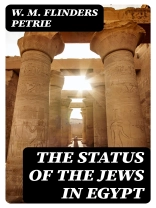In 'The Status of the Jews in Egypt, ’ W. M. Flinders Petrie meticulously examines the historical, social, and economic circumstances of Jewish communities in ancient Egypt. With a keen eye for detail, Petrie employs a blend of archaeological evidence, textual analysis, and historical context, positioning his work within the broader framework of Jewish diaspora studies. His literary style is characterized by clarity and rigor, reflecting a commitment to scholarly integrity while engaging with previous academic discourses on the subject. Through comprehensive analysis, Petrie sheds light on the complexities of cultural identity and integration faced by Jews in a diverse and often contentious society. W. M. Flinders Petrie, a pioneering archaeologist and Egyptologist, devoted his life to unearthing the rich tapestry of ancient civilizations. His extensive travels and excavations throughout Egypt provided him with unique insights into the intercultural dynamics of the time. Petrie’s deep engagement with the artifacts and texts related to Jewish existence and influence in Egypt is underpinned by his commitment to understanding how ancient peoples navigated their identities and social statuses. This essential read is highly recommended for scholars, historians, and general readers interested in Jewish history, ancient Egypt, and the intricate web of cultural expressions. Petrie’s thorough and thoughtful approach not only expands existing knowledge but also invites critical reflection on the complex interrelations of diverse communities throughout history.
O autorze
William Matthew Flinders Petrie (1853–1942), known as W. M. Flinders Petrie, was a pivotal figure in the field of archaeology, particularly Egyptian archaeology. Not only was he responsible for significant contributions to the systematic methodology in the field, but he was also an avid writer, publishing numerous works that explored various aspects of Egyptian culture, history, and society. His keen interest in Egyptology is reflected in texts such as 'The Status of the Jews in Egypt, ’ which showcases his broader research into the historical interactions and status of different peoples in ancient Egypt.
Petrie’s scientific approach to excavation and his methods—such as sequence dating to classify Egyptian pottery—revolutionized the way excavations were conducted and interpreted. His works often reflect his methodological rigor and attention to detail, which have earned him recognition as a precursor to modern archaeological techniques. Throughout his long career, Petrie was dedicated to the conservation of artifacts and understanding the past, influencing subsequent generations of archaeologists. Petrie’s literary contributions, along with his archaeological discoveries, garnered him respect, making his works central references for students and scholars of Egyptology and the history of the Near East.












